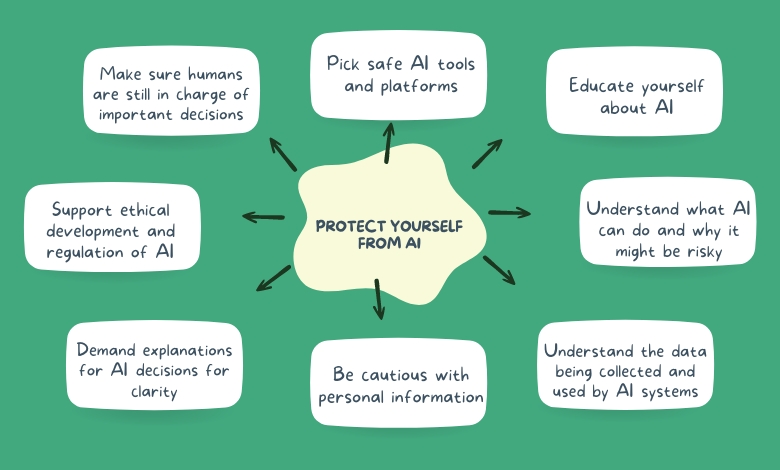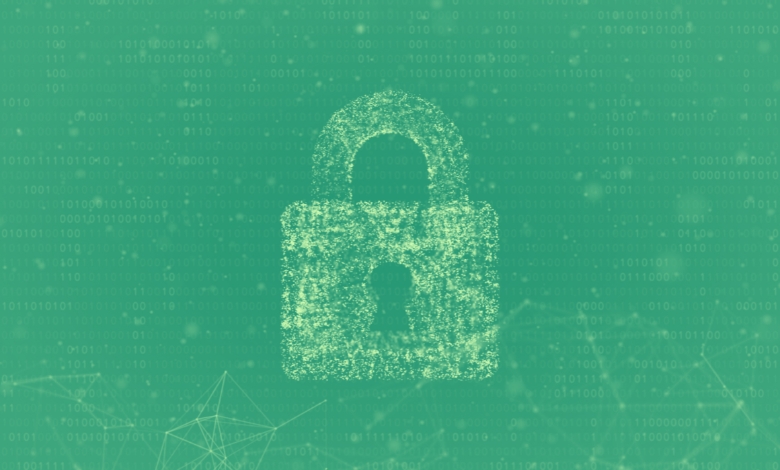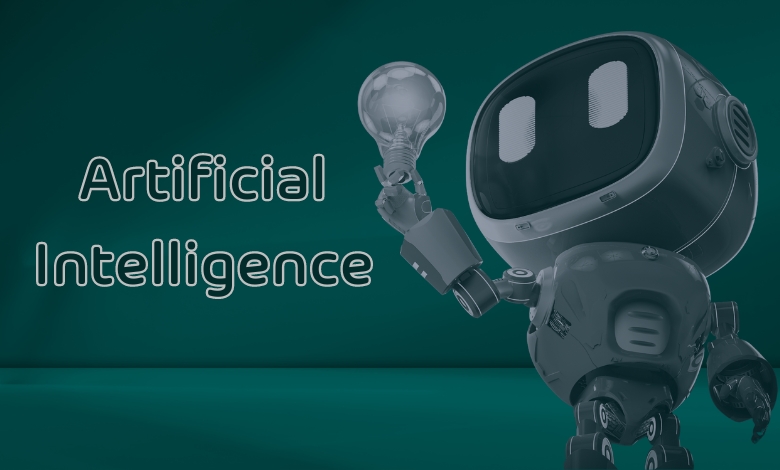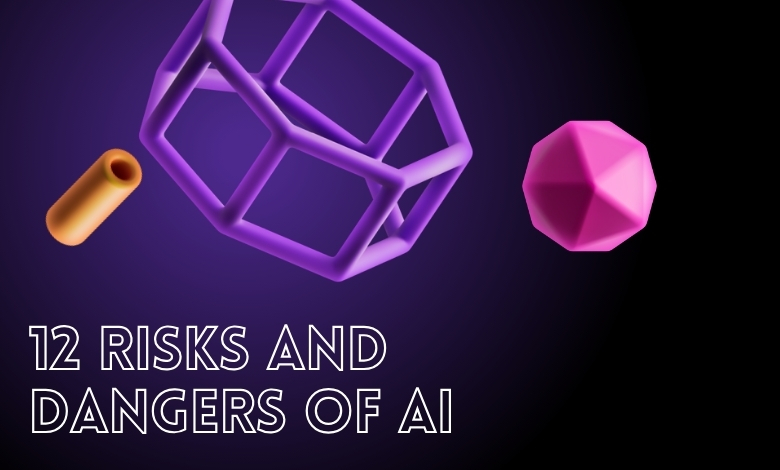How to Protect Yourself from Artificial Intelligence: I’ve outlined 8 crucial steps to shield yourself from its associated risks and dangers.
Artificial Intelligence has zoomed from sci-fi fantasy to a real game-changer in our daily grind. In my own experience, I’ve seen AI switch up our routines, simplify complex tasks, and kick open doors to creativity. But, let’s not ignore the flip side – it’s got its own bag of issues, especially when we talk about ethics.
In this post, you’re going to pick up 8 essential steps on how to stay one step ahead of artificial intelligence.
Ready? Let’s dive in.
Article Breakdown
What is Artificial Intelligence?
Artificial Intelligence is the new big thing in tech, changing all our gadgets and what they do for us. It’s about making smart systems that learn as they go, think for themselves, and can even decide on their own.
But as cool as AI is for moving us forward, it’s got its moments that make you go “whoa” and leave you scratching your head. Surprisingly, We have to be careful about how we introduce it, ensuring it’s good for everyone.
Sam Altman, the head of OpenAI, got real in a 2016 talk with the New Yorker. He wasn’t just dreaming about AI’s great future; he was also thinking about the “what ifs,” like AI turning against us like in sci-fi movies. Hearing this from someone like Altman makes you stop and think.
Potential Risks and Dangers of AI
AI is a big deal in technology, doing stuff by itself without our help. It has its benefits but also comes with significant risks. Here are some risks and issues with AI you might face:
- AI might cause job losses by taking over human tasks, possibly leading to lots of unemployment and shaky economies.
- If we’re not careful, AI can really pump up the biases found in data, messing with decision-making across different fields.
- Companies working with AI have to stick to tight rules about keeping data safe and being ethically responsible to dodge potential issues.
- The risk of data leaks, cyber-attacks, and unauthorized secret access increases as it gathers a lot of private data.
The above are some of the risks that you can encounter with artificial intelligence. Explore our detailed explanation on the potential challenges you may face with artificial intelligence.
Steps to Protect Yourself from Artificial Intelligence:

There are several essential steps you can take, when it comes to protecting yourself from artificial intelligence.
- First and foremost, make sure to select safe AI tools and platforms that prioritize security and privacy.
- Educate yourself for AI by means of staying knowledgeable at the present day trends inside the field.
- Next, it is important to understand what AI is capable of and why it might pose dangers is crucial for shielding your data and privacy.
- Take the time to comprehend the styles of facts being gathered and used by AI systems before engaging with them.
- Be careful when sharing private information online, as it is able to potentially be accessed or misused through AI algorithms.
- Demand transparency in AI selection-making processes to benefit clarity on how automated systems operate.
- It’s super important to keep an eye on making ethical progress in AI tech and ensure it aligns with what society values, sticking to the laws and rules.
Remember that humans ought to continually remain in control of critical decisions concerning artificial intelligence.
Step 1 – Pick safe AI tools and platforms
Choosing safe AI tools and platforms is crucial. As you all know AI is becoming a huge part of our lives, but it’s very important to use platforms known for their safety and reliability.
Before using any AI tool or platform, it’d be nice to thoroughly research its reputation, security measures, and past performance. Always go for providers that prioritize data privacy and user information protection.
One smart approach is to read reviews and feedback from current users. This method provides insights into the product’s effectiveness and trustworthiness. Additionally, seeking advice from AI experts can significantly aid in making informed decisions.
You can minimize risks associated with artificial intelligence by carefully selecting AI tools and platforms, thus ensuring a safer and more secure experience.
Step 2 – Educate yourself about AI
It’s important to know about AI because it’s used a lot every day. This helps us use its good parts and handle any bad parts.
The core concepts of Artificial Intelligence like machine learning and neural networks is key if you want to use AI smartly. They are important not just to unlock its benefits but also to spot and fix any ethical issues or mistakes. Also, this includes dealing with biases and being careful with data to avoid any bad outcomes.
Getting into AI is essential for using it smartly and avoiding problems from misuse or confusion. It’s really important for pros to really understand AI to keep things on the up and up and make sure everything goes smoothly.
To learn more about AI, you can increase your knowledge using available resources such as:
- Online courses
- Tutorials
- Books
- Seminars
You can check out my complete guide, where I’ve also explained what artificial intelligence is.
Step 3 – Understand what AI can do and why it might be risky
Ever wondered about AI? It’s like having a super-smart friend who can quickly go through tons of information, find patterns, and make decisions without us doing anything. Quite impressive, don’t you think? Though, there’s a bit of a downside.
Here’s the thing: AI can be biased. Imagine if it learned everything from old comic books. It might think the world works like those comics. If AI learns from biased information, it might make unfair decisions, like messing up who gets a job or a loan.
AI can make decisions without really telling us how. Trusting it blindly with important things like health or safety is risky.
So, what’s the plan? It’s a good idea to learn AI. It’s important to get what AI can do and its quirks before you dive into using it. This lets us enjoy AI’s good parts and avoid the bad parts.
Keeping up with AI is not only interesting but also fun.
Step 4 – Understand the data being collected and used by AI systems
Ever thought about AI and all the data it uses? Let me explain. AI is like a friend who needs a lot of info to decide anything. This could be about your favorite pizza or where you hang out. But then you realize, that’s a lot of personal info you’re giving away!
Knowing what data AI is collecting is super important. It’s like knowing what people say about you when you’re not there. When you know, you can see how it might be used. Not knowing what you’re sharing with AI isn’t smart. It’s all about keeping your private stuff private.
So, what can you do? Take control! Keep an eye on your data and where it’s going. It’s like making sure you look good in your digital mirror. Being a little detective with your digital footprint can prevent trouble later. Nobody wants their info used without their okay.
Remember, being smart and careful in the digital world is crucial.
Step 5 – Be cautious with personal information
Ever wondered how to keep your personal info safe from all the AI out there? Be careful with what you share online. With AI taking in so much data, it’s wise to think about the info you’re sharing and who might access it.
Think twice before sharing personal details online or with AI devices.Think about whether you actually need to share that info. Keeping your privacy safe is super important, so be picky about what you share and where.
Ever really read those privacy policies or terms of service?If you’re like the majority, likely not. However, knowing how your data is used is a good step for protecting your personal information.
Try to share less personal information. The less you share, the smaller the risk of someone misusing your data.
Remember, keep your personal info private to stay safe online. With so much AI around, let’s be smart and put our privacy first.
Step 6 – Demand explanations for AI decisions for clarity
So, the next step is to demand explanations for AI decisions to ensure clarity. How? It’s important to understand AI because it’s a big part of our daily lives. What’s the key? We need to know how it works.
Ever wondered why Siri or Alexa played that particular song or suggested that new coffee spot? Me too! That’s why I’m all for asking questions and getting some solid answers. It’s like, if we start getting the why behind AI decisions, we’re unlocking a new level of smart. Plus, it keeps the genius folks making this tech on their game, making sure they’re doing their best.
Asking hard questions isn’t just for fun, though. It’s about making sure everything’s cool and ethical. With AI being a part of so many things – from the news we read to the ads we see – it’s super important to make sure it’s playing fair.
So, next time your favorite AI does something unexpected, don’t just let it go. Ask why! It’s all about making these tech wonders as reliable and trustworthy as that go-to friend for life advice.
Step 7 – Support ethical development and regulation of AI
So, it’s really important to maintain ethical standards and ensure that when we chat with AI chatbots, we’re using them as a force for good, not for trouble.I understand that AI is simplifying our lives, but it’s important to play fair by maintaining openness and responsibility, right?
I’ve been thinking, if we give a little push to developers and companies to think about ethics first, we might dodge a lot of issues, like accidentally making AI that’s biased or unfair. It’s about making sure AI is awesome and respects what we stand for.
Now, about the rules – They keep AI safe and fair, making sure we innovate without going too far. It’s like making sure everyone plays nicely in a game.
I’ve talked with lots of professionals – from policymakers to tech experts. So, we’re making good plans for what AI will do next. It’s like we’re making a guide for AI, to help us without causing problems.
Step 8 – Make sure humans are still in charge of important decisions
So, here’s the thing – it’s super important to keep humans in control, okay? AI is super cool, for sure. It’s like a math wizard and can make our lives a lot easier. But, when it’s time to make big decisions, it has to be us in charge.
Letting AI do its thing without us watching over could end up in some not-so-good places. We’ve seen those movies, haven’t we? But, seriously, we humans are good at understanding feelings and knowing right from wrong in a way AI just doesn’t.
Having us lead the way means we add a touch of kindness, making sure everything stays nice and fair.
And, about being responsible – when humans are in charge, we know who to thank or, well, who to talk to if stuff doesn’t go right. Like, if your AI toaster keeps messing up your breakfast, you’d want to know there’s someone you can chat with. What does it do? It keeps everything clear, builds trust, and makes sure we’re all following the rules.
Guidelines for Businesses and Governments to Safeguard Against AI Risks
For businesses and governments wanting to stay safe from AI risks, here’s what you gotta do:
- Beef up your cyber security to keep that sensitive data safe.
- Have clear rules and protocols on how data is collected and used in AI systems.
- Regularly check those AI algorithms to make sure they’re ethical and transparent.
- Team up with folks who know the ins and outs of AI ethics and regulations.
- Create a culture where people are in charge of the big AI decisions.
If you follow a few clever tricks, you can easily avoid the tricky parts while grabbing all the awesome benefits of AI.
Final Thoughts
My advice? Be super careful. I’m all about pushing for AI that’s done right and ethically. And hey, let’s not forget about keeping things safe because security is key. Plus, we’ve gotta have a human keeping an eye on things, no question.
Knowing what’s up is my way to avoid any surprises from AI. What’s yours? Got any advice on dealing with AI? Let’s talk.



